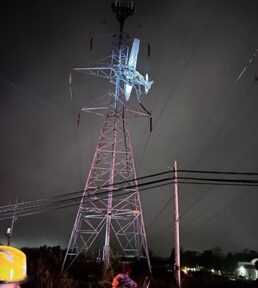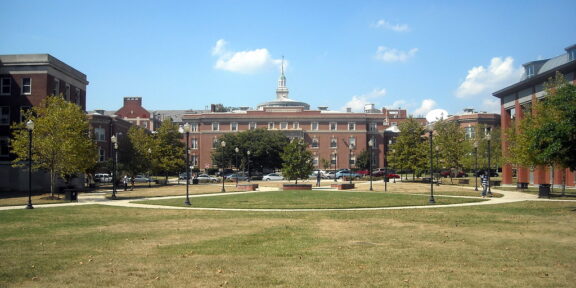When Roger Brown, a resident of Ward 4, entered the multi-purpose room of Barnard Elementary School at 6:15 P.M., he was quite taken aback by the level of energy in the room. Brown, whose son is a 3rd grader at Barnard, had prepared talking points for his appointment with the Mayor. But to his surprise, he was only greeted by dead silence when he entered the DC Public School (DCSP) Reorganizing and Rightsizing hearing in Ward 4. “I am very upset about the format of this meeting. I thought I was going to be able to speak out to Mayor Fenty and Chancellor Rhee, ask them questions, and get some responses,” said Brown. “This is no way to show me that they care.”
There certainly seemed to be a collective sense of uncertainty on all accounts at the Ward 4 hearing. The chairs in the room were set for 100 attendees, of which only 16 were occupied. The meeting was scheduled to run for at least two hours but ended in one hour. Moreover, parents and members of the community were asked to come prepared with verbal and written grievances and questions, but no one was there to hear or answer them. Instead, four female moderators were positioned on the multi-purpose room stage facing 16 attendees and 84 vacant seats, typing and recording the comments of anyone willing to make that lonely walk to the podium.
In an effort to enhance the quality of the DC Public School (DCPS) system, DC Mayor Adrian Fenty announced on November 28, 2007 that the city would consider closing approximately 23 schools as part of a much larger reform initiative that would give him direct control over the DCPS system. After determining that the DCPS budget deficit, the deteriorating infrastructure, and a record that places DCPS as one the lowest performing school systems in the nation, was the result of years of neglect and mismanagement, Mayor Fenty, his newly appointed Public School Chancellor Michelle Rhee, and Deputy Mayor of Education Victor Reinoso announced their plans to improve the district’s public education experience in an initiative they call: Renew, Revitalize and Reorganize DCPS. The Fenty-Rhee-Reinoso plan was developed independently of the DC Council, DCPS officials and parents.
Principle Shirley Hopkinson, principle of Barnard Elementary, insisted that she had no more knowledge of the format or turnout expectations than did the parents. “I was only expecting what I was told which was that the parents of Clark would to give testimonies, but that was about it,” said Principle Hopkinson. “I’m really just facilitating the meeting.”
Among the proposed schools facing closure, are Ward 4’s own Clark Elementary and Rudolph Elementary schools. If the proposal is approved, the plan will disburse children of Clark and Rudolph to other elementary schools in Ward 4 such as Barnard, West, Powell, and Whittier. According to the Fenty-Rhee- Reinoso school plan presented to DC council members, Clark has experienced a 29% decline in enrollment over the past five years, while Rudolph has seen a 50% enrollment decline.
After a period of silence, Heather Tardy, a Ward 4 resident and single mother of three, took the initiative to be the first to speak. “I’ve been watching television and they’re saying that Clark school is one of the schools that will be closed,” said Tardy. “I don’t know what other schools I can send my children to. That’s why I’m here today, to see and hear about what’s going to happen.”
Tardy’s was a simple question, but there was unfortunately no one there to simply answer it for her. “If you have comments, please come forward,” explained a moderator after Tardy returned to her seat. “This is not a question and answer session, and there will be no presentation.”
Tardy had walked to Barnard in the snow for the hearing with her three children who are all in elementary school at Clark. While sending her children to another school is not ideal, she says that she could withstand the transfer if her children were accepted at Barnard, which is within walking distance to her home. But if they are not, she is concerned about how they will make it to school each morning as she does not currently own a vehicle and has to get herself to work. “I just hope they can attend a school within our boundaries. I thought I was going to get some answers, but I guess I’ll have to wait,” said Tardy.
After another long period of silence, Jennifer Rosenbaum, a teacher at Barnard and resident of Columbia Heights, approached the hearing stand with her questions about capacity levels and program funding. “I’m just concerned that if you add on three more grades and bring in kids from potentially other schools, that there won’t be enough room for everyone to participate at Barnard, said Rosenbaum. We have some wonderfully unique programs and I would hate to have any of them cut to extend the school to more students and higher grade levels.”
While she wasn’t the only educator in attendance, Rosenbaum was the only educator to verbally express some concern about the proposed plan to close and consolidate DC public schools. Among her grievances, was a plea for Chancellor Rhee to consider the impact of her three-year-old preschool students sharing a hallway and other facilities with 6th to 8 th graders. “I’m sure we would do as much as we could to separate them in terms of space, but the school is not huge and there are social influences to consider,” said Rosenbaum. “There are benefits but it also has a potential negative impact.”
Children that were in attendance also had their concerns about transferring schools. I like my teachers at Clark and the way they teach us,” said Raymard, Tardy’s son whose in the 2 nd grade. “Plus I would miss all of my friends.”
Brother and sister, Benjamin, who is a 4th grader, and Benjamina who is a 5th grader, were trailing along with their father, Benjamin, Sr., and were very curious as to why their school is being closed. “I really just came so I could find out why they want to close my school,” said Benjamin. “But now I still don’t know.”
The DCPS hearing in Ward 4 more than likely sent parents, children, and educators home with more question marks than they initially had. “The details?” Asked Principle Hopkinson. “I have no more information than the parents themselves. So I don’t have anything to add because I don’t want to speculate.




